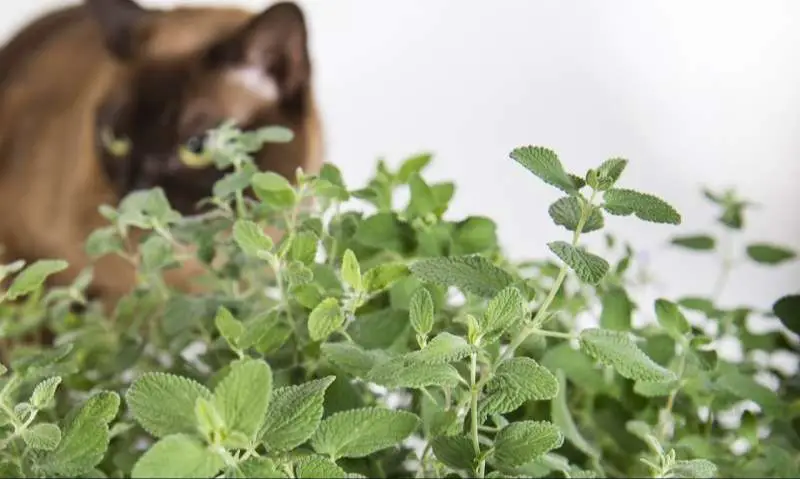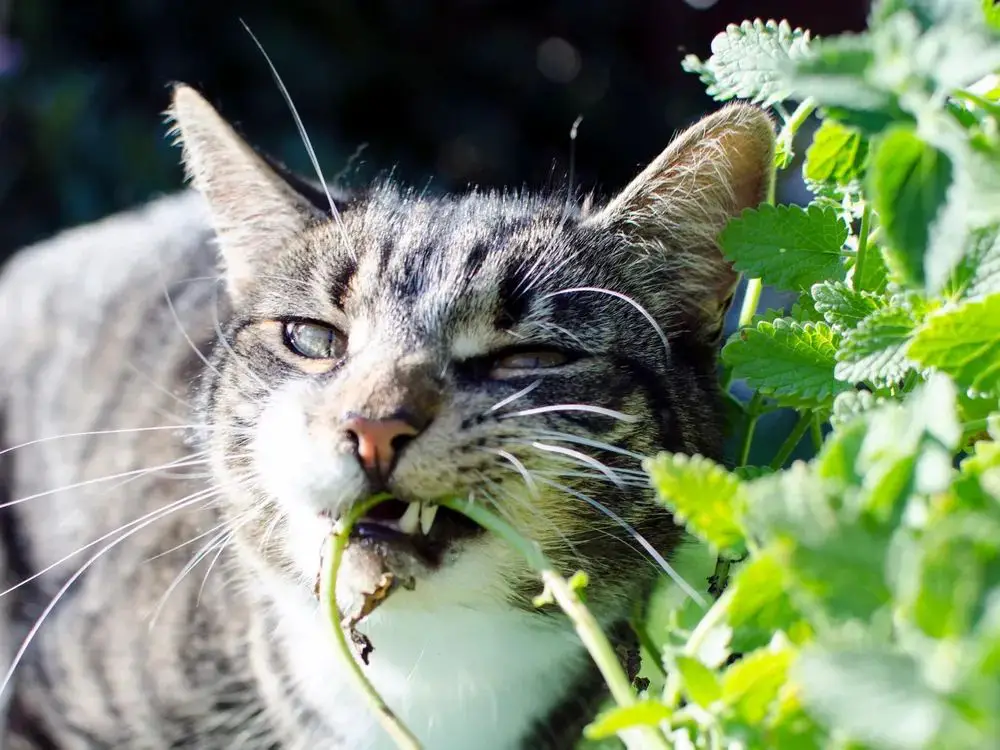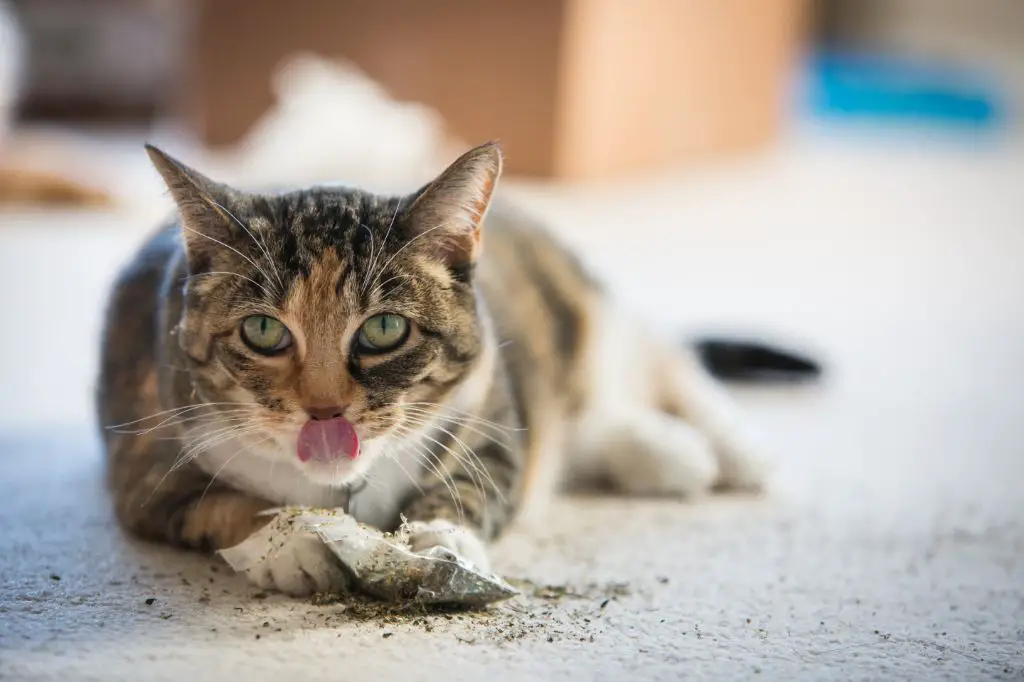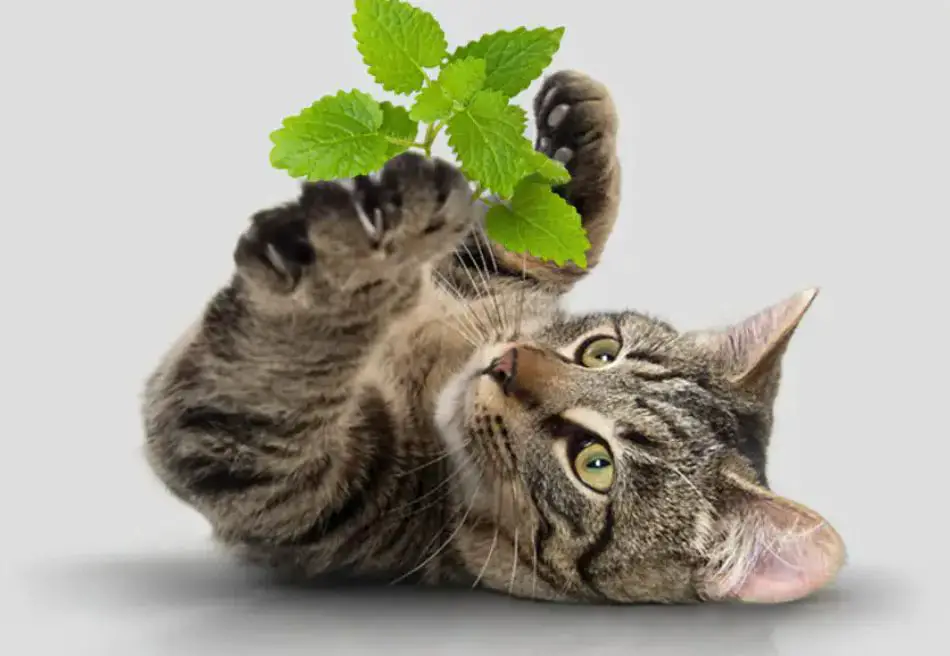For centuries, cat owners have been amused and delighted by the strange effects that catnip has on felines. When exposed to catnip, cats may sniff, lick, roll, rub, eat or chew on the aromatic herb. They often become extremely playful and active, almost intoxicated. It’s no wonder that catnip is beloved by cat lovers and cats alike!
What is Catnip?
Catnip, botanically known as Nepeta cataria, is a short-lived perennial herb that is a member of the mint family of plants (Wisconsin Horticulture). It grows wild in some regions of North America, Europe, and Asia. The stems of catnip plants are typically square, and the leaves are oppositely arranged and toothed. Small white or lavender flowers bloom on catnip in the summer.
Catnip is known for its irresistible scent and flavor that are highly attractive to domestic cats as well as some other felines. The minty aroma comes from nepetalactone, an organic compound in catnip’s essential oil.
Catnip Contains Nepetalactone
The main chemical compound in catnip that causes the attraction and euphoric response in cats is called nepetalactone. Nepetalactone is an organic compound that acts as a cat attractant and causes the behavioral effects induced by catnip in domestic cats [1]. Nepetalactone is similar to valepotriates which are found in valerian root and also have a sedative effect.

Around two thirds of cats are affected by nepetalactone when exposed to catnip. The response has been observed in cats ranging from young kittens to mature adults. Nepetalactone is found in especially high concentrations in the leaves and stems of catnip plants.
Not All Cats React to Catnip
While many cats are attracted to catnip, not all cats respond to it. Research indicates that around 50-70% of cats are affected by catnip 1. The response to catnip is an inherited trait and about 30% of cats lack the gene that makes them responsive to nepetalactone 2.
Kittens typically do not respond to catnip until they are around 6 months old, likely because their brains are still developing 3. Senior cats may also show less interest in catnip as they age. So while catnip affects many felines, it does not provoke a universal response.
Catnip Response is Inherited
Research indicates that sensitivity to catnip is likely an inherited trait. According to a 1962 study by NB Todd published in the Journal of Heredity, the response to catnip was observed to be hereditary in domestic cats (1). By analyzing the pedigrees of 222 cats, Todd found that catnip sensitivity appeared to be inherited as an autosomal dominant gene. Kittens tended to exhibit the same reaction as their mothers, even if raised in isolation.

The reason for this inherited catnip sensitivity is not fully understood, but some speculate it may have evolved to induce hunting behavior. When exposed to catnip, cats often exhibit behaviors resembling hunting – stalking, chasing, and pouncing. The chemical nepetalactone in catnip may trigger these instincts. Overall, researchers estimate about 50-70% of cats inherit the sensitivity to catnip (2).
Catnip Triggers Pleasurable Response
When cats smell or ingest catnip, it activates receptors in their brain that are related to pleasure and euphoria. The chemical responsible for this reaction is called nepetalactone, which is found in the essential oil of catnip plants. Nepetalactone is structurally similar to cat pheromones and interacts with receptors in the cat’s vomeronasal organ, which detects pheromones. This interaction with pheromone receptors likely produces the pleasurable response (Scientific American).
The euphoric effects of catnip don’t last very long, usually wearing off within 5-15 minutes. Cats need time to “reset” before catnip will affect them again. The pleasurable reaction is caused by nepetalactone binding to the pheromone receptors. After this interaction, the receptors become fatigued or desensitized for a period before they can be activated again (Science Magazine).
Catnip Has a Stimulating Effect
One of the most well-known effects of catnip on cats is that it often causes excitable, energetic behavior. When inhaled, the active chemical compound nepetalactone binds to receptors in a cat’s nose, which triggers a response in the brain leading to the release of neurotransmitters like dopamine and serotonin. These neurotransmitters are associated with feelings of pleasure and reward.
The stimulatory effects of this chemical reaction usually last between 5 and 15 minutes. During this time, cats often exhibit behavior like purring, grooming, rolling around, and shaking their heads. They may playfully chase imaginary prey or attack toys. Some cats even vocalize more than usual when exposed to catnip.
Researchers believe this stimulating, euphoric response mimics the effects of cat pheromones and environmental scents that trigger mating and hunting behaviors. While the catnip reaction is involuntary and harmless, it can sometimes be intense. Cat owners are advised not to give catnip to kittens under 6 months old, and to limit catnip exposure for older cats to avoid overstimulation.
Overall, when used moderately, catnip provides a safe and enjoyable high for many cats. The stimulating, feel-good response it triggers offers cats mental enrichment and stress relief.
Sources:
https://www.scientificamerican.com/article/experts-how-does-catnip-work-on-cats/
https://www.vox.com/2014/9/12/6136451/catnip-cats-science
Catnip is Safe for Cats
Catnip is considered non-addictive and harmless for cats. The active chemical compound in catnip, called nepetalactone, binds to receptors in a cat’s nose and has a pleasurable effect. However, cats have a refractory period after being exposed to catnip, during which they are temporarily unable to experience the effects again for usually 1-2 hours. This refractory period prevents overindulgence and regulates the catnip response.

Research shows catnip has no serious side effects and is not addictive like some drugs can be for humans. The harmless pleasurable response wears off on its own. Most experts agree catnip is safe for cats to enjoy.
Cats also tend to lose interest in catnip after several minutes of use. While the olfactory fatigue sets in, large ingestion of catnip can sometimes cause minor gastric upset or vomiting. However, this is very rare and not harmful long-term.
Some key signs catnip is safe for cats:
- Non-addictive
- Does not harm or sedate a cat
- Has a temporary effect
- Causes no lasting side effects
- Refractory period prevents overindulgence
Overall, regular and moderate exposure to catnip is considered harmless and does not require limiting your cat’s access. Most cats enjoy their catnip responsibly and within safe limits on their own.
Other Uses for Catnip
In addition to being enjoyed by cats, catnip has some other uses for humans as well. The most common is using catnip to make an herbal tea or tincture that can promote relaxation or aid with sleep in people. According to Drugs.com, catnip has been used medicinally to treat cramps, indigestion, and to promote menstruation. The natural chemicals in catnip, like nepetalactone, are responsible for many of these benefits.
Catnip is also known to help deter certain insects like mosquitoes when rubbed on the skin or grown in the garden. The strong aroma of catnip can help mask other attractants and drive away bugs looking for a meal. This makes catnip a useful natural repellent both indoors and outdoors.
Conclusion
Cats exhibit an extremely pleasurable and stimulating response to catnip due to the nepetalactone compound found in the herb. Approximately 80-90% of cats inherit the genes that make them sensitive to catnip and their response can be triggered by sniffing, licking, or eating it. While catnip can cause a temporary high, it is safe for cats and is often used to calm anxiety and provide enrichment to indoor cats. The unusual reaction cats have to catnip remains somewhat mysterious, but there’s no doubt this minty herb holds an irresistible appeal for most felines. This fun and quirky behavior is just one of the many qualities cat lovers adore about their favorite pets.


